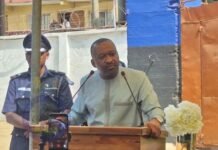By Jacob Macauley and Dr. Victor Moinina
Sierra Leone presents a paradox: rich in resources yet plagued by poverty and crumbling infrastructure. The nation’s heavy reliance on taxes to fuel government operations further complicates its economic landscape. The bustling streets of Freetown narrate this tale – a blend of vibrancy and struggle.
Despite abundant resources like diamonds and iron ore, mismanagement and corruption have hindered equitable economic growth. Abdul Kamara, an Economics Professor, points out, “Our wealth should be a blessing, but it’s often a curse, benefitting a few while most remain impoverished.”
Tax revenues constitute a significant 16% of the GDP, a hefty burden by West African standards. Critics argue high taxes stifle entrepreneurship and fuel the informal sector, where many evade taxes to survive. Aminata Conteh, a small business owner, laments, “The rates are too high. We either evade taxes or close shop.”
However, former Finance Minister, Jacob Saffa, contends that taxes are vital for infrastructure and social programs, essential for fostering long-term growth. Efforts to broaden the tax base face hurdles like corruption and resistance from influential businesses.
In the midst of this, Sierra Leone has embarked on ambitious projects like the new airport terminal, funded through public-private partnerships. While hailed as a solution for outdated infrastructure, critics question its prioritization amidst pressing socio-economic needs.
The Goods and Services Tax (GST), implemented in 2010, has sparked controversy. Many view it as a burden, straining small traders and businesses. The National Revenue Authority (NRA) defends it as crucial for revenue generation, citing low tax-to-GDP ratios.
Despite increased revenue, challenges persist. Businesses call for tax restructuring to boost competitiveness, while citizens demand relief from the GST’s weight. Finding this balance is critical for Sierra Leone’s development.
Addressing these challenges requires a multi-faceted approach:
Comprehensive Tax Reform: Review and simplify the tax system, considering reductions in GST to stimulate growth.
Formalization of the Informal Sector: Encourage informal businesses to formalize, expanding the tax base and reducing evasion.
Targeted Investment in Economic Development: Prioritize strategic investments to stimulate growth and job creation.
Improvement of Public Services and Governance: Enhance service delivery and governance to build public trust and ensure efficient use of tax revenues.
Capacity Building and Taxpayer Education: Invest in training for tax officials and educate taxpayers to foster compliance and transparency.
Regional Cooperation and Harmonization: Collaborate regionally to combat tax evasion and promote fair tax policies.
Navigating these steps will be crucial for Sierra Leone’s journey towards sustainable growth and prosperity. Balancing revenue generation with fostering business growth is key to unlocking the nation’s potential and lifting its people out of poverty.





The Answer to your “Intriguing question is NO”. But perhaps, “A Valid Question is: How to Fix Capitalism in a Rich/Poor Nation like Sierra Leone and Unleash a New Wave of Socio-Economic Growth for All?”